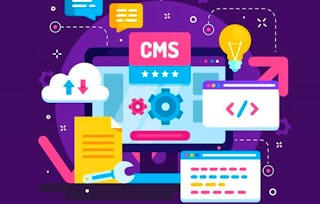This comprehensive course is designed to guide learners from foundational to advanced programming practices in Python, with a strong emphasis on functional problem-solving and object-oriented design. Throughout six structured modules, learners will apply, analyze, and create solutions using real-world constructs such as user-defined functions, recursion, classes, inheritance, sequences, and generators.

Mastering Python Programming: Apply, Analyze, and Build

Mastering Python Programming: Apply, Analyze, and Build
This course is part of Python Mastery: Core Concepts, Data Structures & OOP Specialization

Instructor: EDUCBA
Included with
20 reviews
Skills you'll gain
Details to know

Add to your LinkedIn profile
18 assignments
See how employees at top companies are mastering in-demand skills

Build your subject-matter expertise
- Learn new concepts from industry experts
- Gain a foundational understanding of a subject or tool
- Develop job-relevant skills with hands-on projects
- Earn a shareable career certificate

There are 6 modules in this course
This module introduces foundational programming concepts in Python with a focus on abstraction and functional design. Learners will explore how to build and reuse functions, pass parameters effectively, and apply these principles to solve structured problems. Through hands-on examples, they will understand how to decompose complex problems, work with mutable data structures, and reverse processes using Pythonic techniques. The module aims to build clarity around scoping, parameter passing, and iterative transformation of data.
What's included
8 videos3 assignments
This module explores the foundational and advanced aspects of recursion in Python, along with the use of functional programming tools. Learners will delve into variable scope and nested environments, understand the mechanics of recursive function calls, and apply recursion to classic problems such as factorials, exponentiation, and binary search. In addition, learners will harness the power of Python's built-in functional utilities like map() and filter() to process data efficiently and declaratively.
What's included
6 videos3 assignments
This module introduces core object-oriented programming (OOP) principles in Python, including polymorphism, encapsulation, and inheritance. Learners will explore how to define class attributes and methods, override functionality across subclasses, restrict access to internal data using encapsulation, and create flexible designs that use shared behavior across multiple types. Through hands-on examples, learners will gain experience with customizing object behavior and managing access to class internals using Python’s naming conventions and object-oriented syntax.
What's included
7 videos3 assignments
This module explores advanced object-oriented programming concepts in Python, including the structure and behavior of class namespaces, multiple inheritance, and robust error-handling mechanisms. Learners will understand how Python manages class and object attributes, how to define and manage multiple superclasses, and how to construct and handle exceptions using custom exception classes. The module also demonstrates best practices for catching, raising, and managing multiple exceptions within Python functions, allowing learners to write safer, more maintainable code.
What's included
7 videos3 assignments
This module focuses on the use of constructors, class inheritance tools, and special methods that enable Python objects to behave like built-in data structures. Learners will gain insight into constructor customization using __init__, access parent functionality using super(), and implement sequence and mapping behavior using magic methods like __getitem__, __setitem__, and __len__. The module concludes with lessons on subclassing and enhancing class functionality by overriding or extending existing behavior, allowing learners to build complex, reusable, and Pythonic object models.
What's included
7 videos3 assignments
This module explores specialized object-oriented features in Python, including the use of static and class methods, property-based attribute access, and iteration protocols. Learners will understand how to use decorators like @staticmethod and @classmethod, intercept attribute access with __getattr__, and implement both custom iterators and recursive generators. Through these topics, learners will enhance their ability to write Pythonic, reusable, and memory-efficient code using advanced techniques in class design and data handling.
What's included
6 videos3 assignments
Earn a career certificate
Add this credential to your LinkedIn profile, resume, or CV. Share it on social media and in your performance review.
Explore more from Software Development
 Status: Free Trial
Status: Free Trial Status: Free Trial
Status: Free Trial Status: Free Trial
Status: Free Trial
Why people choose Coursera for their career

Felipe M.

Jennifer J.

Larry W.

Chaitanya A.
Learner reviews
- 5 stars
95%
- 4 stars
5%
- 3 stars
0%
- 2 stars
0%
- 1 star
0%
Showing 3 of 20
Reviewed on Feb 4, 2026
The modules are logically sequenced and easy to follow, making complex topics like inheritance and custom iterators feel approachable.

Open new doors with Coursera Plus
Unlimited access to 10,000+ world-class courses, hands-on projects, and job-ready certificate programs - all included in your subscription
Advance your career with an online degree
Earn a degree from world-class universities - 100% online
Join over 3,400 global companies that choose Coursera for Business
Upskill your employees to excel in the digital economy
Frequently asked questions
To access the course materials, assignments and to earn a Certificate, you will need to purchase the Certificate experience when you enroll in a course. You can try a Free Trial instead, or apply for Financial Aid. The course may offer 'Full Course, No Certificate' instead. This option lets you see all course materials, submit required assessments, and get a final grade. This also means that you will not be able to purchase a Certificate experience.
When you enroll in the course, you get access to all of the courses in the Specialization, and you earn a certificate when you complete the work. Your electronic Certificate will be added to your Accomplishments page - from there, you can print your Certificate or add it to your LinkedIn profile.
Yes. In select learning programs, you can apply for financial aid or a scholarship if you can’t afford the enrollment fee. If fin aid or scholarship is available for your learning program selection, you’ll find a link to apply on the description page.
More questions
Financial aid available,


